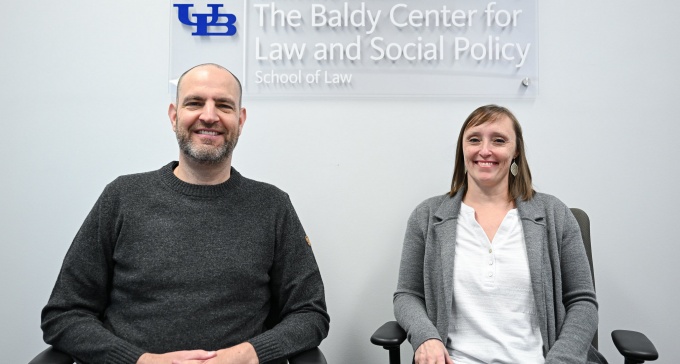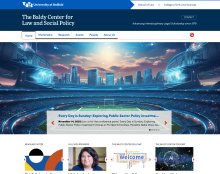
The Baldy Center Director Matthew Dimick with the Center’s Associate Director Amanda Benzin.
A full slate of ideas at The Baldy Center
As the new academic year gains traction, The Baldy Center for Law and Social Policy is already in high gear.
The Baldy Center—the School of Law’s laboratory for the interdisciplinary study of law—is a place where University at Buffalo scholars can rub elbows with some of the most innovative thinkers in law and society. They bring expertise across the social science disciplines to bear on difficult issues like immigration, prison policies, social movements and inequality.
And they share their insights in The Baldy Center speaker series, workshops and conferences, building an intellectual community along the way.

All programs are open to the public, with full information and registration available on The Baldy Center website.
“Sometimes people on the outside have a hard time understanding what we do,” says Professor Matthew Dimick, director of the center. “It can be seen as theory over practice. But because law is so important in society, we need to understand how it has these broader social effects. In many ways, Law and Society study is saying that the law is not just for lawyers and judges—it’s essential for the businessperson, for the citizen and for other people who are affected by laws and how they work.”
A wide-ranging Distinguished Speaker Series kicked off in early September with UCLA law professor Hiroshi Motomura discussing Borders and Belonging, a new book in which he looks at immigration policies and responses in the United States and worldwide. Upcoming are visits by Michalyn Steele of BYU Law, discussing the Supreme Court’s handling of federal Indian law (Sept. 19); Dario Azzellini of the University of Duisberg-Essen, Germany, on how global climate change affects the future of work (Sept. 26); Carl Wilén of Lund University in Sweden, speaking on the legal legacy of the Haitian Revolution at the start of the 19th century (Oct. 3); and an address by Amna Akbar of the University of Minnesota Law School (Oct. 10).
“These are scholars who are doing critical work in law and social policy, and really trying to advance scholarly conversations,” notes Amanda Benzin, The Baldy Center’s associate director. “Writers and scholars are always trying to improve, and they’re often presenting works in progress, so participants have a hand in helping to shape their research.”
Also in the planning stages is a major conference: “Every Day Is Sunday: Exploring Public Sector Policy Investment Choices in Pro Sports Facilities,” on Nov. 14. Municipalities are investing hundreds of millions of dollars in stadiums and arenas for privately owned sports teams, and the conference will explore the legal and political undercurrents of those decisions. Cases in point: the $850 million that New York State and Erie County are contributing to the construction of the Buffalo Bills’ new stadium, and the upcoming renovation of the publicly owned KeyBank Center, home of the Buffalo Sabres. The conference panel will be comprised of Professor Helen “Nellie” Drew '88, who directs the UB Center for the Advancement of Sport; New York Times sports reporter Ken Belson; and Richard Tobe ’74, a former deputy Erie County executive.
Also newly arrived at The Baldy Center this semester are two midcareer legal scholars who are conducting major research projects during academic sabbaticals. They are sociologist Michael Gibson-Light of the University of Denver, who is studying the rise and fall of prisoners’ labor unions in the 1970s; and political scientist Whitney K. Taylor from San Francisco State University, looking at the politics of local prosecution in the United States.
Dimick, in his second year as director of The Baldy Center, is looking to expand the center’s social media presence, furthering UB Law’s reputation as a locus of interdisciplinary legal scholarship. “Younger law professors are going to be on social media,” he says, “and the more they hear about what we’re doing, the better we can make sure everyone in our sphere of influence knows who we are.”
He’s also a principal in the emerging scholarly discipline of Law and Political Economy, which seeks to examine the social, legal, and political basis of the market and economy, taking a broader view than the older, more traditional Law and Economics perspective. With the newly formed Association for Law and Political Economy, The Baldy Center is sponsoring the inaugural conference in the discipline, to be held in the spring at the University of Richmond.